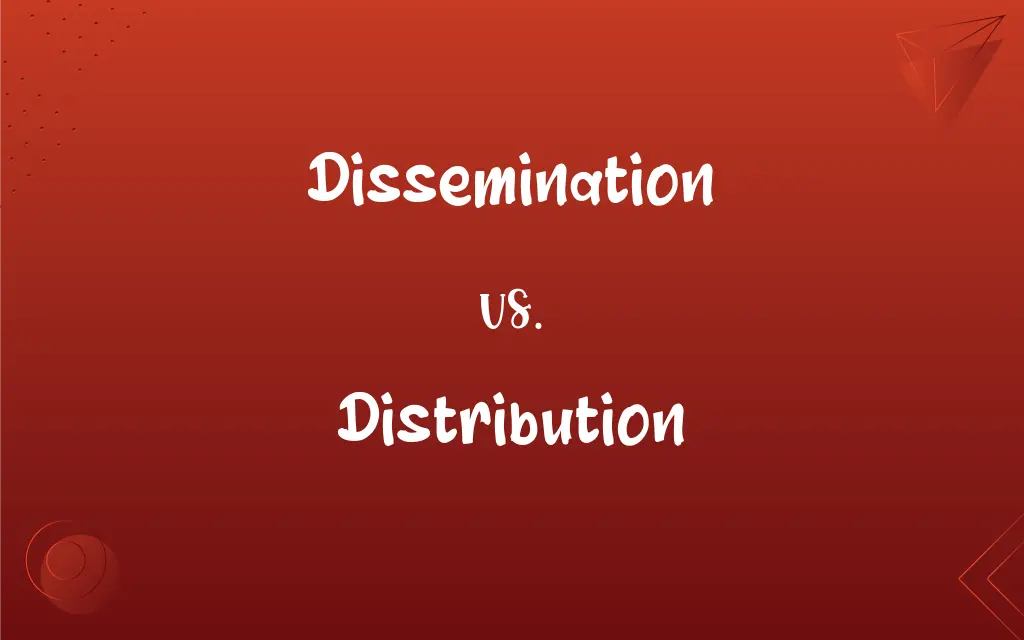Dissemination vs. Distribution: What's the Difference?
Edited by Aimie Carlson || By Janet White || Updated on October 19, 2023
"Dissemination" means spreading information widely; "Distribution" involves the physical delivery of items. Both involve dispersion but in different contexts.

Key Differences
"Dissemination" is the act of spreading something, especially information, widely; it's about circulating knowledge, news, or even data to a wide audience or over a wide area. "Distribution," however, is more about the systematic physical dispersion of goods or resources, often from a central point to various locations. Dissemination focuses on the spread of non-tangible assets (like information), while distribution concerns the allocation of physical items.
In the world of publishing, for instance, "dissemination" would refer to the spread of ideas or findings through a scholarly article, ensuring the information reaches a wide and diverse audience. "Distribution," in this same industry, would involve the physical process of getting books or magazines from the publishers to retailers, and then to individual readers. Here, dissemination deals with the intangible content, while distribution handles the tangible product.
"Dissemination" in the context of health education might involve spreading important information about disease prevention methods, reaching out to communities through various forms of media and communication. "Distribution" in a similar vein might involve the actual process of getting vaccines or medications from storage facilities to clinics or patients. In this scenario, dissemination spreads knowledge, whereas distribution manages the logistics of physical items.
In research, "dissemination" refers to the process of communicating findings, evidence, and knowledge to relevant stakeholders and the wider public. "Distribution" could be used in a research setting too, but it would refer more to the allocation of resources or materials necessary for the research process among various departments or researchers. Dissemination is about spreading knowledge generated from research, while distribution is about resource allocation.
In digital communications, "dissemination" may involve the spread of digital content or media across various platforms or channels, ensuring it reaches the target audience. "Distribution" in a similar context might refer to the systems used to transport data across networks, or the infrastructure that allows digital content to be accessed or downloaded. Dissemination focuses on content reach, while distribution refers to the logistical aspects of content delivery.
ADVERTISEMENT
Comparison Chart
Parts of speech
Primarily used as a noun
Used as a noun
Grammatical role
Subject or object in a sentence
Functions as a subject or object in a sentence
Conjugation
Disseminates, Disseminating, Disseminated
Distributes, Distributing, Distributed
Compound forms
Dissemination is less often used in compound words
Distribution can form compound words, e.g., redistribution, distributional
Collective Nouns
Not applicable
A distribution of resources, products, etc.
ADVERTISEMENT
Dissemination and Distribution Definitions
Dissemination
The act of spreading news, information, or knowledge.
The dissemination of these facts is crucial for public awareness.
Distribution
The way in which something is shared or exists over a particular area or among a particular group of people.
The distribution of wealth in the country is highly uneven.
Dissemination
The widespread circulation of information or ideas.
Through the internet, rapid dissemination of ideas is possible.
Distribution
A set of values showing the spread of a whole set of numbers.
The data is analyzed to create a distribution showing the most common responses.
Dissemination
The action of broadcasting a message or information.
The government’s effective dissemination of guidelines helped during the crisis.
Distribution
The process of marketing and supplying goods, especially to retailers.
Dissemination
The propagation of data or information.
Scientists are responsible for the dissemination of their research findings.
Distribution
(Law) The transmission of inherited property to its heirs after taxes, debts, and costs of the estate have been paid.
Dissemination
To scatter widely, as in sowing seed.
Distribution
Something distributed; an allotment
Distributions from a retirement account.
Dissemination
To spread abroad; promulgate
Disseminate news.
Distribution
The geographic occurrence or range of an organism.
Dissemination
To become diffused; spread.
Distribution
The geographic occurrence or range of a custom, usage, or other feature.
Dissemination
The act of disseminating, or the state of being disseminated; diffusion for propagation and permanence; a scattering or spreading abroad, as of ideas, beliefs, etc.
Distribution
(Statistics) A characterization of the occurrence of the actual unique values in a set of data (as in a frequency distribution) or of the theoretical unique values of a random variable (as in a probability distribution).
Dissemination
The act of disseminating, or the state of being disseminated; diffusion for propagation and permanence; a scattering or spreading abroad, as of ideas, beliefs, etc.
The universal dissemination of those writings.
Distribution
(Mathematics) A generalized function used in the study of partial differential equations.
Dissemination
The opening of a subject to widespread discussion and debate
Distribution
An act of distributing or state of being distributed.
Dissemination
The property of being diffused or dispersed
Distribution
An apportionment by law (of funds, property).
Dissemination
The act of dispersing or diffusing something;
The dispersion of the troops
The diffusion of knowledge
Distribution
The process by which goods get to final consumers over a geographical market, including storing, selling, shipping and advertising.
Dissemination
The distribution of content across various media.
Social media platforms are key in the dissemination of breaking news.
Distribution
Anything distributed; portion; share.
Distribution
The result of distributing; arrangement.
Distribution
The total number of something sold or delivered to the clients.
The distribution of my little rock magazine is about 3,000.
Distribution
The frequency of occurrence or extent of existence.
Distribution
(economics) The apportionment of income or wealth in a population.
The wealth distribution became extremely skewed in the kleptocracy.
Distribution
(card games) The way in which a player's hand is divided in suits, or in which a particular suit is divided between the players.
The declarer had 3-6-2-2 distribution.
Distribution
A probability distribution; the set of relative likelihoods that a variable will have a value in a given interval. Category:en:Functions
Distribution
A subset of the tangent bundle of a manifold that satisfies certain properties; used to construct the notions of integrability and foliation of a manifold.
Distribution
(software) A set of bundled software components
A Linux distribution
Distribution
(finance) The process or result of the sale of securities, especially their placement among investors with long-term investment strategies.
Distribution
(logic) The resolution of a whole into its parts.
Distribution
The process of sorting the types and placing them in their proper boxes in the cases.
Distribution
(steam engines) The steps or operations by which steam is supplied to and withdrawn from the cylinder at each stroke of the piston: admission, suppression or cutting off, release or exhaust, and compression of exhaust steam prior to the next admission.
Distribution
(rhetoric) A rhetorical technique in which a subject is divided into multiple cases based on some property or properties, and each case is addressed individually.
Distribution
The act of distributing or dispensing; the act of dividing or apportioning among several or many; apportionment; as, the distribution of an estate among heirs or children.
The phenomena of geological distribution are exactly analogous to those of geography.
Distribution
Separation into parts or classes; arrangement of anything into parts; disposition; classification.
Distribution
That which is distributed.
Distribution
A resolving a whole into its parts.
Distribution
The sorting of types and placing them in their proper boxes in the cases.
Distribution
The steps or operations by which steam is supplied to and withdrawn from the cylinder at each stroke of the piston; viz., admission, suppression or cutting off, release or exhaust, and compression of exhaust steam prior to the next admission.
Distribution
(statistics) an arrangement of values of a variable showing their observed or theoretical frequency of occurrence
Distribution
The spatial property of being scattered about over an area or volume
Distribution
The act of distributing or spreading or apportioning
Distribution
The commercial activity of transporting and selling goods from a producer to a consumer
Distribution
The action of sharing something out among a number of recipients.
The distribution of food supplies was well-organized.
Distribution
The activity or process of supplying goods to stores and other businesses.
The company specializes in the distribution of organic products.
Distribution
The action or process of supplying something.
Electricity distribution remains a challenge in remote areas.
FAQs
Can "dissemination" refer to the spread of misinformation?
Yes, dissemination can be the spread of any information, true or false.
Can "distribution" occur digitally?
Yes, it can refer to the digital delivery of software, apps, or digital content.
Does "distribution" always involve physical goods?
Mostly, but it can also involve the allocation of digital content or resources.
What's a "distribution channel"?
It's a chain of businesses through which a good or service passes until it reaches the end consumer.
Is "dissemination" applicable in digital marketing?
Yes, it's key to spreading content or messages to a target audience online.
Do "dissemination" and "communication" mean the same?
They're similar, but dissemination is more about widespread communication or broadcast.
Is "distribution" the same as "delivery"?
Not exactly. Distribution can involve delivery, but it's also about the allocation among various recipients.
Can "dissemination" be controlled or restricted?
It can be attempted, but once information is out, controlling its spread can be difficult.
Can "dissemination" be unintentional?
Yes, information can sometimes be disseminated without deliberate intent.
Is "distribution" always equitable?
Not necessarily. It depends on the criteria used for the distribution process.
Is "dissemination" only for scholarly articles?
No, it can apply to spreading any form of information, data, or ideas widely.
Is "dissemination" a one-way process?
Typically, yes, it's from the source to the audience, but feedback can influence future dissemination.
Does "distribution" involve logistics?
Yes, it involves the logistical planning and execution of transporting goods to recipients.
Is "dissemination" faster in the digital age?
Yes, digital platforms facilitate instant and widespread dissemination.
Can "dissemination" be selective?
Yes, the spread of information can be targeted to specific audiences.
Can "distribution" be exclusive?
Yes, certain goods may only be distributed through specific channels or to certain recipients.
Can "distribution" refer to statistical data?
Yes, it can refer to the spread of values in a data set.
Is "distribution" a business function?
Yes, it's a critical business activity in the supply chain.
Does "dissemination" involve interpretation?
Not directly. It's more about the spread rather than the interpretation of information.
Does "distribution" require infrastructure?
Typically, yes, especially for the physical distribution of goods.
About Author
Written by
Janet WhiteJanet White has been an esteemed writer and blogger for Difference Wiki. Holding a Master's degree in Science and Medical Journalism from the prestigious Boston University, she has consistently demonstrated her expertise and passion for her field. When she's not immersed in her work, Janet relishes her time exercising, delving into a good book, and cherishing moments with friends and family.
Edited by
Aimie CarlsonAimie Carlson, holding a master's degree in English literature, is a fervent English language enthusiast. She lends her writing talents to Difference Wiki, a prominent website that specializes in comparisons, offering readers insightful analyses that both captivate and inform.































































